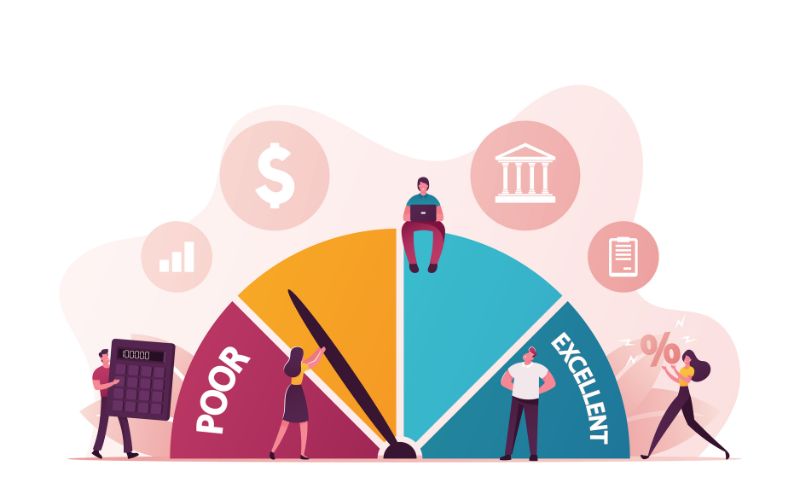Don't Drive Yourself Nuts Finding a New Car
Summer will be here before you know it, and you’ve probably already started thinking about all the...

It’s no secret that credit can be confusing, and it also plays a big part in your ability to receive loans, get a credit card, purchase/rent a home, or even find employment in some cases. Your credit score is more than just a number in the 300-850 range, it’s also your access to a variety of credit products and lower interest rates. Understanding credit, knowing the difference between good and bad credit, and how to build your credit score can play a huge part in setting you up for future financial success.
What’s Credit Anyways?
At its very core, your credit score is what helps financial institutions and other businesses determine whether or not you’re a financial risk to them. The higher your credit score is, the less of a risk you’ll pose. That’s why paying your bills on time, and in full, when possible, is vital to creating and maintaining a good credit score. When you default on a loan or pay late, that can lower your score and might cause some hesitation in a lender’s decision to work with you.
It’s also important that when you get a new credit card, whether it’s your first one or not, that you’re paying attention to your credit limit. Your credit limit is given to you by the financial institution where you received your card and is the maximum amount you’re allowed to borrow. Keep in mind that just because you have that limit, doesn’t mean you should be reaching it. In fact, it’s recommended that you try not to use more than 30% of your credit limit to avoid significant damage to your credit score.
What’s Good Credit?
There’s a variety of information that is gathered by credit reporting bureaus that affects the way your credit score is calculated, some with more weight in the matter than others. Payment history makes up for around 35% of your score, taking into account how often you pay late, if you’ve ever declared bankruptcy, were foreclosed upon, etc.
Your payment history is closely followed by the amount of debt that you currently have, which accounts for 30% of your score. It’s based off of how much credit you’re using in comparison to what you have available to you (AKA credit utilization ratio). For example, if you have a credit limit of $5,000, and are using around $2,500 of that, you’ll have a higher credit utilization ratio (50%) than someone who only uses $2,500 on a card with a credit limit of $15,000 (about 17%). Other pieces of information that affect your score are your length of credit history, new credit, and your credit mix. But how do you know if your credit score is good?
As mentioned, the higher your credit score is, the less friction you’ll endure when trying to obtain a loan, a new credit card, or other credit products. For most lenders, having a score of at least 670 would be considered a good credit score, and a score of at least 800 is considered exceptional. However, it’s important to keep in mind that this is somewhat subjective, as each lender is different. For one lender a score of 670 might be perfectly fine for them, but another lender might require you to have a minimum credit score of 700 for you to qualify with them. It’s recommended that you look into a few potential lenders in the case that one lender might accept your credit score when another doesn’t.
How to Build Up (or Build Back) Your Credit Score
Finding out that your credit score is less than desirable can absolutely be a disappointment, especially if you’re new to the world of credit. You might not know how or why this happened, or maybe you missed a payment and have no clue how to build it back. Rest assured there are many ways that you can start building your credit score or bring it back to good standing after an unfortunate drop.
It’s also a good idea to not open any new accounts, or close old ones at least a year before you know you’ll need your credit score in good standing. While closing old accounts sounds like it might not be a big deal in theory, doing so can lower your credit utilization ratio as you’ll have less credit available for you to use. On the other side, if someone you’re looking to receive a loan from sees that you’ve opened multiple accounts in a short period of time, they might see you as a higher risk to them as opposed to someone who’s maintained the same couple of cards for multiple years.
Communication and Preparation are Key
Learning about credit and how to build it up and maintain a healthy credit score can be a stressful undertaking. However, there are all kinds of resources available to you to help you out when you’re just starting out, or your credit score took a hit.
It’s vital to know that if you do find yourself in a tough spot and struggling to make payments, for example, if you lose your job, that you should talk to your creditors about potential options to keep you on track. At the end of the day, we’re all human and unexpected things are bound to happen at one point or another. If you’re up front and honest with your creditor about your situation, there’s a good chance that they’ll be willing to work something out with you, so you won’t have to miss payments or defer on your loan. Making sure that you’ve started building up an emergency savings account for those times where you’re struggling can also play a huge part in keeping you on track with payments, as well.
Related Articles

Summer will be here before you know it, and you’ve probably already started thinking about all the...

Buying a new car can be an intimidating and sometimes complicated process. When it comes to applying...

If you have a checking account, you probably have a debit card to use with it as...

Access NuMark services online or at any of our physical locations.

Join the NuMark family and get proactive about your financial future.

Guard your financial well-being with our Consumer Protection Insurance – the perfect way to safeguard your finances from the unexpected.

From safeguarding your home to ensuring the financial security of your family, NuMark’s insurance options provide peace of mind for a brighter and more secure future.